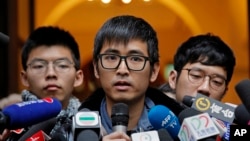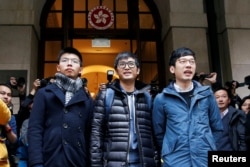In a city famed for large, peaceful street protests, Hong Kong’s highest court has sent a sharp warning to those who march: Any injuries will mean the event will be deemed violent, and harsh punishments will result.
That message was contained in a Court of Final Appeals ruling released Tuesday that quashed the prison sentences of three of the most prominent leaders of the city’s democracy movement. The judgment found that the appellate court erred when it jailed Joshua Wong, Nathan Law and Alex Chow in August for leading the occupation of a government plaza in 2014, touching off a monthslong sit-in that sought elections free from China’s interference. Their demands were never met.
The high court disagreed with appellate judges who found the men’s initial sentence in 2016, which included community service and a suspended prison term, had been too lenient. Wong, Law and Chow served nearly three months in jail before they were released in November on bail, pending the appeal. The justices warned that future participants in “large scale unlawful assemblies involving violence … will therefore be subject to the new guidelines.”
In “cases in which the defendant is shown to have actually participated in violent acts, or to have incited others to commit the offense … [that] will justify increased sentences,” the five-member panel wrote. “Similarly, where the offender is shown to have encouraged, if not actually incited, the unlawful assembly, for example, by virtue of his status or leadership of others joining the assembly, this may justify attributing to him culpability for the actual violence involved.”
Civil disobedience threatened
Meeting the press outside the courthouse, the three defendants were visibly angry. They said the ruling will punish future demonstrators who join civil disobedience actions.
“Even though the judges allow us to leave court, we still face the same range of prison sentencing in the future,” said 21-year-old Wong, the most well-known defendant. “In the future, if anyone organized actions related to civil disobedience, just like the Civic Square action, we will face a sentence and be locked up in prison for a few months or even more than a year. That’s why I say, ‘It is a long term battle for us.’”
Eric Cheung, a lecturer at the University of Hong Kong’s law school, said the court’s ruling did not mean that all future protesters would face prison terms. The court, as it affirmed the principles of civil disobedience — breaking the law to provoke the public to fight injustice — reiterated that activists must be peaceful. If there is violence during a large protest, “circumstances and noble motives would count much less,” he said. “But if you don’t follow that route and cause injury to others, even in innocent ways ... you would defeat the noble cause for civil disobedience.”
Wong, Law and Chow convinced the lower court magistrate that their commitment to democracy and voting rights, and their clean records, did not merit time in prison. The previous justice secretary, Rimsky Yuen, brought the appeal, a decision criticized by several lawyers as a political prosecution.
Government pleased
The ruling seemed to please the government. Teresa Cheng, Hong Kong’s new secretary of justice, said in a statement: “The three defendants were charged because of their acts, not their beliefs, in forcing their way into the Forecourt of the Central Government Offices … resulting in the injuries of 10 persons.” The office said it welcomed “the message that unlawful assemblies involving violence, even a relatively low degree, will not be condoned and may justifiably attract sentences of immediate imprisonment in the future.”
Last week, members of a U.S. congressional commission that reviews human rights issues in China nominated the three students and the entire 2014 democracy effort for a Nobel Peace Prize. The bipartisan letter cited the activists’ “peaceful efforts to bring political reform and self-determination to Hong Kong.”
Carrie Lam, Hong Kong’s chief executive who was appointed by a group of business leaders and Beijing loyalists, scolded the U.S. government for intervening.
“I regret that some foreign politicians have seemingly used such a respectable international award for political interference,” she told the press. “The so-called Occupy movement is an illegal incident, and we must act in accordance with the law.”
Chow, the oldest of the three protesters, called the ruling “complete nonsense” and said it misread what violence really means. The court “doesn’t provide a very good framework for the democracy movement of Hong Kong to move on,” he said. “If recapturing Civic Square is ruled as one of the violent actions, then what action, in what instance, will be peaceful?”






